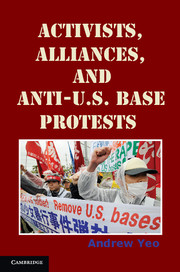Book contents
- Frontmatter
- Contents
- List of Figures
- List of Tables
- Preface and Acknowledgments
- List of Abbreviations
- Introduction
- 1 Anti-Base Movements and the Security Consensus Framework
- 2 Under a Weak Security Consensus
- 3 The U.S.-Japan Alliance and Anti-Base Movements in Okinawa, 1995–1996
- 4 Anti-Base Movements in Ecuador and Italy
- 5 South Korean Anti-Base Movements and the Resilience of the Security Consensus
- 6 Alliance Relations and the Security Consensus Across Time
- 7 Activists, Alliances, and the Future of U.S. Basing Strategy
- Appendix: Selected List of Interviews
- Bibliography
- Index
7 - Activists, Alliances, and the Future of U.S. Basing Strategy
Published online by Cambridge University Press: 05 June 2012
- Frontmatter
- Contents
- List of Figures
- List of Tables
- Preface and Acknowledgments
- List of Abbreviations
- Introduction
- 1 Anti-Base Movements and the Security Consensus Framework
- 2 Under a Weak Security Consensus
- 3 The U.S.-Japan Alliance and Anti-Base Movements in Okinawa, 1995–1996
- 4 Anti-Base Movements in Ecuador and Italy
- 5 South Korean Anti-Base Movements and the Resilience of the Security Consensus
- 6 Alliance Relations and the Security Consensus Across Time
- 7 Activists, Alliances, and the Future of U.S. Basing Strategy
- Appendix: Selected List of Interviews
- Bibliography
- Index
Summary
This book addressed two key questions. First, when and how did anti-base movements affect U.S. base policy decisions? Second, how did host governments maneuver between domestic politics and U.S. relations in the wake of anti-base opposition? The central claim was that elite beliefs and perceptions regarding U.S. relations in the context of national security (a) functioned as a political opportunity structure inhibiting or facilitating movements and (b) influenced patterns of movement–government interaction leading to particular policy outcomes.
As highlighted in the Philippine and Ecuadorian cases, anti-base movements were more likely to influence basing policy outcomes under conditions of weak security consensus. A weak consensus, leading to policy incoherence and division among elites, enabled activists to penetrate the state. With easier access to elites, anti-base forces presented an alternative security agenda by demanding the removal of U.S. bases. Not only did anti-base activists challenge elites advocating a pro-U.S. foreign policy stance, but their demands resonated with several key elites responsible for base policy decisions. Therefore, by forming ties with sympathetic elites and shaping the public discourse on bases, activists played an important role in pushing for major base policy changes.
Conversely, as demonstrated by Okinawan, Italian, and South Korean anti-base movements, activists often faced stiff resistance from governments under a strong, resilient security consensus. Shaped by and embedded within historical legacies, anticommunist ideology, and domestic institutions, a core consensus favoring alliance relations with the United States persisted among key elites in Tokyo, Rome, and Seoul.
- Type
- Chapter
- Information
- Activists, Alliances, and Anti-U.S. Base Protests , pp. 178 - 200Publisher: Cambridge University PressPrint publication year: 2011



